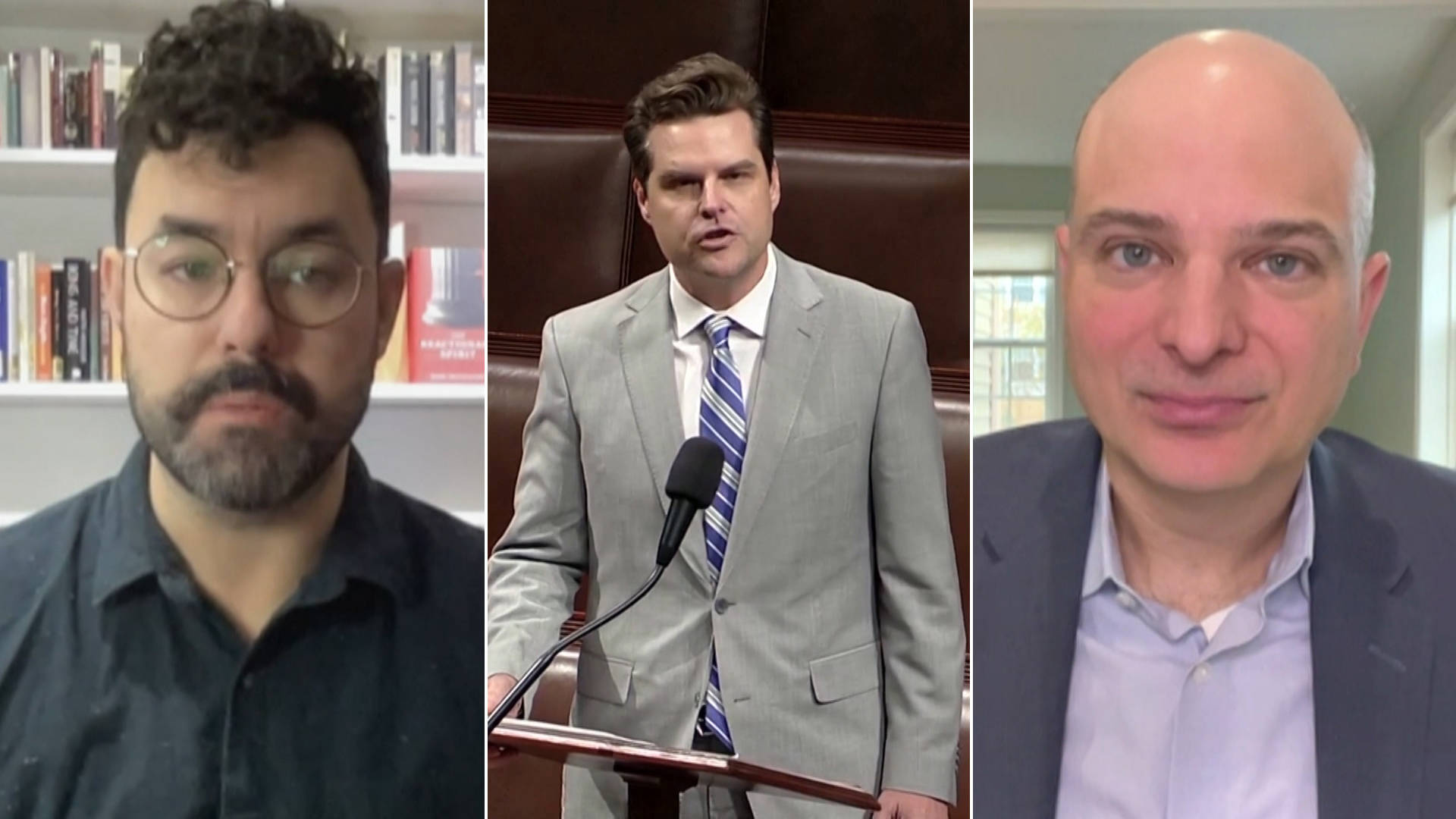This is a rush transcript. Copy may not be in its final form.
AMY GOODMAN: This is Democracy Now!, democracynow.org, “War, Peace and the Presidency.” I’m Amy Goodman.
Many lawmakers on Capitol Hill are expressing shock at President-elect Donald Trump’s selection of Florida Congressmember Matt Gaetz to be attorney general. Gaetz is a far-right Trump loyalist who led the effort to oust House Speaker Kevin McCarthy last year and has defended participants in the January 6th insurrection. The nomination of Florida Congressman Gaetz is widely seen as part of Trump’s plans to weaponize the Department of Justice to target political enemies.
But his confirmation in the Senate is not guaranteed. Gaetz was recently under a federal sex trafficking investigation involving an underage girl. While federal charges were never filed, the House Ethics Committee has also been looking into Gaetz’s actions. The committee was scheduled to release what was expected to be a “highly damaging” report about Gaetz as soon as Friday. But on Wednesday, following his nomination, Gaetz resigned as congressmember from the House, likely putting an end to the probe.
The House Ethics Committee had previously said it was investigating whether Gaetz, quote, “may have engaged in sexual misconduct and/or illicit drug use, shared inappropriate images or videos on the House floor, misused state identification records, converted campaign funds to personal use, and/or accepted a bribe, improper gratuity, or impermissible gift, in violation of House Rules, laws, or other standards of conduct,” unquote.
Four years ago, Gaetz sought a preemptive pardon from Trump.
This is Republican Senator Markwayne Mullin of Oklahoma speaking to CNN last year, shortly after Gaetz helped oust House Speaker Kevin McCarthy.
SEN. MARKWAYNE MULLIN: You’ve got to think about this guy. This is a guy that didn’t have — that the media didn’t give the time of day to after he was accused of sleeping with an underage girl. And there’s a reason why no one in the conference came and defended him, because we had all seen the videos he was showing on the House floor, that all of us had walked away, of the girls that he had slept with. He would brag about how he would crush ED medicine and chase it with an energy drink so he could go all night. This is obviously before he got married. And so, when that accusation came out, no one defended him, and then no one on the media would give him the time of the day. All of a sudden he found fame because he opposed the speaker of the House?
AMY GOODMAN: That was Republican Senator Markwayne Mullin speaking about Congressman Matt Gaetz last year.
We’re joined now by two guests. Zack Beauchamp is a senior correspondent at Vox covering the crisis of global democracy, the author of The Reactionary Spirit: How America’s Most Insidious Political Tradition Swept the World. Noah Bookbinder is the president of the D.C. watchdog nonprofit Citizens for Responsibility and Ethics in Washington, known as CREW. He formerly prosecuted public corruption cases for the Department of Justice.
We welcome you both to Democracy Now! Noah Bookbinder, let’s begin with you. First talk about how important the attorney general is, and especially for our global audience, to explain what it means to run the Department of Justice, and then to talk about who Matt Gaetz is.
NOAH BOOKBINDER: Sure. So, the attorney general is the chief law enforcement officer of the United States. The attorney general runs the Department of Justice, which brings all federal prosecutions in the United States but also handles vast amounts of civil litigation, environmental litigation, civil rights litigation. The Department of Justice sets legal policy for the executive branch of the government. It’s hard to overstate what an important position the attorney general is, both in the actual management of the justice system in the United States and in setting the tone for how justice works in the United States.
Now, I don’t think anybody should be shocked when Donald Trump does exactly the kind of thing that Donald Trump said he would do and the kinds of things that he’s done in the past. So, in some ways, this is not a shocking nomination. Matt Gaetz is a loyalist to Donald Trump. He is a firebrand in the spirit of Donald Trump. But he is somebody who has no appreciable law enforcement experience. He has downplayed the January 6th attacks on the Capitol and actually promoted conspiracy theories about them. And he’s been the subject of legal and ethical investigations himself. So he is certainly not the kind of person you want setting the tone for the justice system in the United States, not the kind of person you want making decisions about how the Department of Justice is going to work.
AMY GOODMAN: Now, Noah, if you can explain the sex trafficking allegations that Matt Gaetz has been dealing with for years? You have this reportedly very damaging report, though no criminal charges were brought, that the Department of Justice was going to release. And by him resigning yesterday, the report apparently doesn’t come out — unless it’s leaked.
NOAH BOOKBINDER: Well, so, on that last point first, it is true that the House Ethics Committee generally investigates members of the House of Representatives while they are there. And often, or generally, investigations close when members leave. But there actually is precedent for that committee to investigate members after they have left and release reports after they have left. So that is something that that committee can do, should do, as this nomination is considered. And there’s no reason why that investigation and that report has to die because Congressman Gaetz just resigned.
He was investigated for — apparently, for sexual conduct with an underaged person, for potential involvement in trafficking, for potential drug use, for potential sharing of inappropriate videos on the House floor. We don’t know the facts, because, as of now, there haven’t been charges, and we haven’t seen that House Ethics Committee report. But, you know, our organization has actually sued to obtain the Department of Justice’s files on their investigation, and there is that House report that reportedly is very damaging and that ought to be made public, and it should be made public right away.
AMY GOODMAN: I want to go to House Speaker — former House Speaker Kevin McCarthy speaking at Georgetown in April about then-Congressman Matt Gaetz.
REP. KEVIN McCARTHY: And I’ll give you the truth why I’m not speaker. It’s because one person, a member of Congress, wanted me to stop an ethics complaint because he slept with a 17-year-old, an ethics complaint that started before I ever became speaker. And that’s illegal, and I’m not going to get in the middle.
AMY GOODMAN: So, that is former House Speaker Kevin McCarthy. I want to bring Zack Beauchamp into the conversation, senior correspondent for Vox. If you can tell us more about Matt Gaetz, also his past connection with Joel Greenberg, and his résumé, however thin it is?
ZACK BEAUCHAMP: Yeah, I mean, thin is right. He is a law school graduate, so technically he’s a lawyer, but there is no law enforcement experience to speak of, as we just learned. He’s been a member of Congress. He’s 42 years old, if I’m recalling the exact number correctly. And, look, I am in my late thirties, nothing against younger adults being ambitious, but you really need to be extraordinarily impressive if you want to, at the particular stage in his career, take a job as big as attorney general. And Gaetz just doesn’t have any relevant qualifications to do that.
Moreover, his chief qualification — right? — as far as I can tell, based on all the reporting that’s come out, is his willingness to do whatever Donald Trump needs to be done. Right? Trump picked him because, according to a report in The Bulwark this year, sourced to Trump insiders — or, excuse me, this morning — he was going in there, and he wants to start chopping heads — though there’s an expletive in there that I’ve cut out for broadcast purposes. He really, really is the kind of person you would appoint if what you’re trying to do is to take an ax to the nonpartisan functioning of the Justice Department.
AMY GOODMAN: So, I want to go to Matt Gaetz in his own words, speaking at CPAC — that’s the Conservative Political Action Conference — in 2023.
REP. MATT GAETZ: I don’t care if it takes every second of our time and every ounce of our energy. We either get this government back on our side, or we defund and get rid of, abolish the FBI, CDC, ATF, DOJ, every last one of them, if they do not come to heel.
AMY GOODMAN: So, Noah Bookbinder, if you can comment on this and also talk about what it would mean if he was attorney general, what it would mean also in terms of the cases against Donald Trump, the president-elect?
NOAH BOOKBINDER: Yeah, well, one of the key things about the Department of Justice and the attorney general is that they need to have some independence from the administration. There have been protections built in over decades that, you know, you don’t have a president dictating who’s going to be prosecuted, who’s not going to be prosecuted. You know, certainly the president’s policy preferences play a role, but the president should not be deciding what kind of justice is administered.
What you heard from Matt Gaetz is the polar opposite of that. You heard Congressman Gaetz essentially saying that the Department of Justice and these other parts of government have to be brought to “our side,” they have to be brought to heel. They should essentially be made political weapons of a particular party and a particular president. That is not how the Department of Justice has ever functioned and not how it’s meant to function in our system.
So I think there is a real danger that if you put in somebody like Matt Gaetz and he does the kinds of things that he says he’s going to do and that Donald Trump seems to want an attorney general to do, you’re going to have an entirely different, much less democratic system in the United States, where you have a Department of Justice and a justice system that is meant to serve the political objectives of the person in power rather than actually serving justice. And that’s something that, you know, regardless of the decision that Americans made in the election recently, I don’t think there are very many Americans who want that.
AMY GOODMAN: Zack Beauchamp, you tweeted yesterday, “Gaetz at Justice is the clearest signal of authoritarian intent imaginable.” And you also tweeted, “Inside Trump’s ominous plan to turn civil rights law” — well, this was a headline of a piece that you wrote, “Inside Trump’s ominous plan to turn civil rights law against vulnerable Americans.” Talk about both. You had also written about making America hungry again.
ZACK BEAUCHAMP: That’s right. So, my book is about how modern authoritarianism works and why it rises in countries that seemed like previously strong or healthy democracies. And one of the clearest pathways — right? — from getting from a democracy to a more authoritarian system of government is the replacement of key government functionaries and executive figures with loyalists. So, when you take people who had a degree of independence, as the attorney general is supposed to, and you turn them into political apparatchiks who twist the law into whatever the chief executive of the country needs it to be in order to advance his political interests, that, to me, is — that’s sort of like the biggest, clearest “we are in trouble” signal that one could send. And given especially that CPAC clip that you just played and Gaetz’s long track record of talking like this, he’s exactly that kind of person.
Now, the civil rights question you asked — right? — so, what I was trying to do when I wrote that piece is to take what Trump and his staff had talked about sort of abstractly and see how it would play out when it applies to one portion of the Justice Department, specifically the Civil Rights Division, which has a very, very large ambit of responsibilities. But, you know, in brief, you can summarize it as enforcing the laws that are designed to address structural inequalities in the American political system. And so that means that they enforce maybe discrimination law in employment, in housing. It means that they deal with the — sorry, the Voting Rights Act and enforcement of discrimination in voting law, on down the list. Right?
And so, what you can see — excuse me — what you can see, if this department is twisted to do what Trump wants it to do, is a department that functions in the exact inverse of the way it’s supposed to. So, to take anti-discrimination law, what you can do is turn it into anti-discrimination against whites, which is to say dismantling protections for minority groups and using those laws that are designed to create, essentially, an environment of — hi, sweetie, hold on, I’m on TV — to create an environment in which people are prosecuted for creating systems that are designed to ameliorate long-standing patterns of discrimination by calling it a new form of anti-white discrimination.
AMY GOODMAN: I know that you have to go, Zack, to do some child care duties, and so I’m going to let you go. She is very, very sweet. Zack Beauchamp is senior correspondent at Vox covering the crisis of global democracy — and we’ll have you back on all too soon — author of the recent book The Reactionary Spirit: How America’s Most Insidious Political Tradition Swept the World.
But, Noah Bookbinder, given that you don’t have kids who are pulling at your sleeve, I want to ask you about the court cases that Donald Trump faces, or now will not face. You know, a lot of people say the cases are just going to go away. But I think it’s important, before they do, if they do, to remember what they are, what he is dealing with, what will happen to the evidence. Jack Smith is apparently wrapping up — and for, again, a global audience, who is Jack Smith? What are these two federal cases that he’s dealing with? Then we’ll talk about the state cases.
NOAH BOOKBINDER: Yeah, so, Jack Smith is a longtime federal prosecutor who was appointed as special counsel to handle two investigations of Donald Trump. One of them was into misuse and mishandling of classified information, sort of very serious abuses, of information that is crucial to America’s national security, that Trump appears to have kind of left around at Mar-a-Lago, where it was incredibly vulnerable, and to have hidden from the federal government. And the other investigation is an investigation into Donald Trump’s role in efforts to keep him in power after losing the 2020 election and to overturn the results of that election, including inciting a violent insurrection. So these are about as serious a set of offenses for a democracy as you can imagine. Trying to keep yourself in power after you lose an election really cuts at the heart of a democracy. These are not trivial investigations. They are not politically motivated investigations. They’re deeply important investigations to America.
What appears to be happening is that Jack Smith recognizes that the Department of Justice has a policy that says that a sitting president — that the Department of Justice will not prosecute a sitting president. And we’ve always questioned whether that is a legally correct interpretation. It’s certainly even less clear that it applies to an investigation — to investigations like these ones, that began before Donald Trump’s coming term for president. But that is the Department of Justice’s policy. I think Jack Smith looks at that and says these are going to be impossible to bring anyway. And he looks at that further and says that if he stays, he and his team are likely to be fired. It could go beyond that. They could be investigated, which could cause a crisis. And if he dismisses those cases, closes down the investigation, as he may be seeing it, that that could get you to the same place without the crisis, and it is potentially a way to protect his team. But it does mean that these deeply, deeply serious investigations could — you know, could have the plug pulled on them, which is deeply troubling for democracy. I will say that Jack Smith can, and I believe should, and I believe will, release a report before he goes, setting out the findings of these investigations and getting that information to the people of the United States.
AMY GOODMAN: It will be public?
NOAH BOOKBINDER: You know, he doesn’t have to do that. He may not do that. But I think that he will. It’s certainly what special counsel Mueller did in the case that he investigated. It’s pretty standard practice. And I have to imagine that Jack Smith’s team is hard at work on a public report, now that they understand that these cases are very unlikely to make it to trial.
AMY GOODMAN: So, we haven’t even talked about the Mar-a-Lago documents yet — or, I should say, the White House or the government documents that he brought to Mar-a-Lago. But what about the insurrectionists, the hundreds and hundreds of people who are jailed right now, and what you think Donald Trump will do, who bills himself as the law-and-order president, but, what, more than a hundred police officers were injured, a number died, some took their own lives, one had an attack the day after he dealt with the gas?
NOAH BOOKBINDER: Yeah, I mean, this is — you know, these are not people who are being prosecuted for protesting. They are not the subject of political prosecutions. These are people who are being prosecuted for, in most cases, violent offenses, including assaulting police officers. It’s exactly the kind of conduct that law-and-order politicians tend to abhor — right? — attacking police officers. And yet Donald Trump has said that he intends to pardon at least some of these people. And, you know, I think that would be — would send a deeply destructive message to the democracy, that you can try to overturn an election, try to install someone in power who wasn’t elected, and that would be OK, and you can come out just fine. I think that would be a very dangerous message to send.
I think — you know, as I was saying before with the Matt Gaetz nomination, I think we can’t be shocked if Donald Trump does the things that he has said he was going to do. I think people tend to discount a lot of what he says, but I certainly expect that there’s a good possibility that he will do what he said he was going to do, that he will pardon some of these people. And you’ll see, essentially, violent criminals who assaulted law enforcement being set free, because they happen to agree with Donald Trump politically. I think that if that is what occurs, that would be a dangerous day for our democracy.
AMY GOODMAN: Two last quick questions, and we have less than a minute. One is, what happens with the document case? Aileen Cannon got rid of it. There’s talk of possibly he would nominate her to the Supreme Court, which goes to also the recess appointments, this whole issue of what that means, how you get people like Matt Gaetz through, when perhaps the Senate wouldn’t even approve him.
NOAH BOOKBINDER: I think it’s hard to see how that case comes back at this point, where Jack Smith is talking out winding cases down. I think that’s deeply unfortunate. It’s a very clear case with real national security implications. But it’s hard to see a path forward.
Recess appointments, look, we are in a situation where Donald Trump is looking to take unprecedented executive power. There are fewer and fewer checks on that power with a Congress that seems compliant and a Supreme Court that seems compliant. Senate confirmation of nominees is one of the few checks we have left. And if he seeks to subvert that by making large-scale recess appointments, that’s one fewer check on his power [inaudible] —
AMY GOODMAN: And how does he get the power to do that? What does that mean? He just says, “Matt Gaetz is the attorney general”?
NOAH BOOKBINDER: Well, there is a provision in law that says, essentially, when Congress goes into recess, there is an ability to name officials for a limited period of time, because, historically, you had situations where there was an emergency need for officials, and Congress couldn’t get to town as quickly. It is something that traditionally has not been used in large amounts, and this would be unprecedented. It is also for a limited period of time, and so it would then be up to the courts and to Congress to hold the administration to those limits and make sure that even if Donald Trump abuses this power, it’s only temporary, and Senate confirmation is put into play, as it legally needs to be.
AMY GOODMAN: Time enough — let’s say it was year — time enough to destroy documents and also to investigate people that Donald Trump calls the enemy within.
NOAH BOOKBINDER: That’s right. It’s a deeply, deeply dangerous and troubling concept. And I hope the Senate will make it clear that they’re not going to tolerate that. You know, with Trump loyalists dominating his party, I’m not entirely confident that that will happen, but I certainly hope so.
AMY GOODMAN: Noah Bookbinder, president of the D.C. watchdog nonprofit CREW. That’s Citizens for Responsibility and Ethics in Washington. He formerly was a Department of Justice lawyer.
Coming up, we go to Gaza, as a special U.N. committee says Israel’s actions are “consistent with the characteristics of genocide.” Back in 20 seconds.
[break]
AMY GOODMAN: “Ode to Billie Joe” by Lou Donaldson. The famed saxophonist passed away November 9th at the age of 98.











Post comments (0)